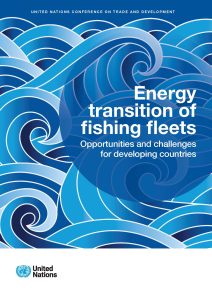This publication from UNCTAD is a timely compilation of knowledge on the emerging sector of energy transition in fishing fleets and its implications for developing countries
This article is by K. Sunil Mohamed (ksmohamed@gmail.com), Retired Principal Scientist & Head of Division, Central Marine Fisheries Research Institute (CMFRI), Chair, Sustainable Seafood Network of India (SSNI) https://ssni.co.in/
A publication of the United Nations Conference on Trade and Development (UNCTAD), Energy transition of fishing fleets: Opportunities and challenges for developing countries, released in 2024, is the work of contributors and reviewers under a study team at UNCTAD that included David Vivas Eugui, Claudia Contreras, Mafalda De Braganca Mendes, Regina Asariotis, Anila Premti, Argyro Kepesidi, and Chantal Line Carpentier.
The book, edited and designed by Claire Ward and Wendy Worrall, provides a comprehensive overview of the energy transition in fishing fleets and its implications for developing countries.
Between 0.1 and 0.5 per cent of all carbon emissions come from fishing vessels, which accounts for roughly four per cent of carbon emissions from the world’s food production. Emissions from fishing fleets are estimated using different techniques (bottom-up vs. top-down) due to a lack of data. According to academic studies, global fishing fleets released 159 mn tonnes of CO2 annually during 2016.
The book discusses the significant contribution of emissions from fishing fleets to climate change and the role of fuel subsidies in exacerbating this issue. It explores the regulatory framework, including measures by the International Maritime Organization (IMO) and regional and national initiatives. It also highlights the technological opportunities and challenges for alternative energy options in fishing fleets, such as biofuels, green methanol, liquefied natural gas (LNG), biogas, green hydrogen, and green ammonia. The book discusses electric and hybrid engines, wind propulsion, energy efficiency measures, and on-board carbon capture as means of reducing emissions.
Emphasizing the economic, trade, environmental and social considerations for the transition of fishing fleets, including impacts on seafood value chains and social implications, the book calls for collaboration and co-operation among stakeholders to achieve a just energy transition in the fisheries sector. It also discusses the importance of clear regulations, trade facilitation, and the inclusion of carbon footprint criteria in sustainability assessments. It highlights the need for comprehensive national plans, co-ordination, and financial support to enable a sound energy transition and decarbonization process in the fisheries sector.
The book discusses the significant contribution of emissions from fishing fleets to climate change and the role of fuel subsidies in exacerbating this issue
Drawing on case studies on the experiences of fishing associations and fisheries service centres in different regions, the book highlights the challenges and progress in energy transition. The countries that have analyzed measures for increasing energy efficiency in the fishing sector are Albania, Liberia, Sri Lanka, Angola, Antigua and Barbuda, Cambodia, Dominica, Seychelles, Sierra Leone, South Sudan and Ecuador, apart from those in the Asia-Pacific region and the European Union (EU).
These countries have included specific measures in their Nationally Determined Contributions (NDCs) or have implemented technologies and practices to improve energy efficiency in the fishing sector. The IMO has encouraged its Member States to develop national action plans aimed at reducing the greenhouse gas (GHG) missions of the shipping sector. To date, eight national action plans have been submitted by Member States, five of which specifically account for fishing vessels in their emissions calculations (namely, Finland, India, the Marshall Islands, Norway and the Republic of Korea).

Overall, the book aims to support policymakers, stakeholders and fishing associations in making informed decisions and implementing sustainable practices in the fishing industry. Nonetheless, there is only limited discussion on policy and regulatory frameworks. The book briefly mentions the IMO and the World Trade Organization agreement on fisheries subsidies. However, it does not provide detailed analysis or recommendations on how these frameworks can be strengthened or improved to support the energy transition of fishing fleets.
The book acknowledges the contributions of experts and fishing associations, but it does not provide direct quotes or perspectives from these stakeholders. Including their insights and experiences would have added more depth and credibility to the book.
While the book mentions the environmental considerations of the energy transition, it does not provide a comprehensive analysis of the potential environmental benefits and risks associated with different alternative energy options for fishing fleets. In general, the book provides a general overview of the opportunities and challenges in the energy transition of fishing fleets. However, it does not provide specific recommendations or actionable steps for developing countries to effectively navigate this transition.
The backdrop of this book is the IMO support for the decarbonization of the fisheries sector. The IMO has adopted a revised GHG strategy for global shipping that aims to reach net-zero GHG emissions from international shipping close to 2050 and ensure the uptake of alternative zero and near-zero GHG fuels by 2030. While not specifically targeting fishing fleets, the IMO’s regulations and measures will have an impact on the carbon intensity of fishing fleets and promote the decarbonization of the fisheries sector.
Europêche, the association of national organizations of fishing enterprises in the EU, also supports the decarbonization of the fisheries sector. In the light of these steps from IMO, this book is timely, and as a compilation of knowledge on this emerging sector, UNCTAD has done a sterling job. This book is a necessary addition to any fisheries development researcher’s reference collection as also to any specialised subject library.
For more
Energy transition of fishing fleets: Opportunities and challenges for developing countries
https://unctad.org/publication/energy-transition-fishing-fleets-opportunities-and-challenges-developing-countries